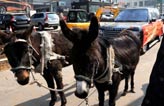Foreign and Military Affairs
Full text: China's National Defense in 2010
Updated: 2011-03-31 11:31
(Xinhua)
The armed forces of the People's Republic of China abide by the Constitution and laws, implement the guidelines of governing the armed forces according to law, strengthen military legal system building, and guarantee and push forward the building of national defense and armed forces in accordance with the requirements of the legal system.
Military Legal System Building
A number of important military laws and regulations have been formulated and revised. In the past two years, the Standing Committee of the NPC has adopted the Law of the People's Republic of China on the People's Armed Police Force, the National Defense Mobilization Law of the People's Republic of China, and the newly revised Law of the People's Republic of China on Reserve Officers. The Central Committee of the CPC and the CMC have approved and promulgated the newly revised Regulations on the Political Work of the People's Liberation Army. The CMC has promulgated the newly revised Regulations on Routine Service of the People's Liberation Army, the Regulations on Discipline of the People's Liberation Army, the Regulations on Formation of the People's Liberation Army, and a new generation of regulations on the work of headquarters. Approved by the CMC, the PLA's General Staff Headquarters, General Political Department, General Logistics Department and General Armaments Department have promulgated the newly revised Outline for Armed Forces Building at the Grass-roots Level, and the General Political Department has promulgated the Guideline for the Ideological and Political Education of the Chinese People's Liberation Army. The State Council and the CMC have jointly promulgated the Regulations on Military Uniform Management, the Regulations on Quality Control of Weaponry and Equipment, and the newly revised Regulations of the Chinese People' s Liberation Army on the Military Service of the Enlisted in Active Service. The general headquarters/departments, Navy, Air Force, Second Artillery Force, military area commands and the PAPF have promulgated a number of military rules and regulations. As of December 2010, the NPC and its Standing Committee has passed laws and issued law-related decisions on 17 matters concerning national defense and military affairs, the State Council and the CMC have jointly formulated 97 military administrative regulations, the CMC has formulated 224 military regulations, and the general headquarters/departments, Navy, Air Force, Second Artillery Force, military area commands and PAPF have enacted more than 3,000 military rules and regulations.
Military laws, regulations and rules have been reviewed and consolidated. In accordance with the 2008 requirements of the NPC Standing Committee, the legal organs of the CMC organized the legal departments of the general headquarters/departments, Navy, Air Force, Second Artillery Force, military area commands and PAPF in reviewing laws and regulations relating to national defense and military affairs. In 2009, the fifth round of review and consolidation of military regulations and rules was conducted, sorting out 921 existing military regulations (including regulatory documents) and 7,984 military rules and regulations (including regulatory documents) promulgated before the end of 2008, and repealing 65 military regulations (including regulatory documents) and 1,214 military rules and regulations (including regulatory documents). A Collection of Military Laws and Regulations of the People's Republic of China (2004-2008), A Collection of Military Rules and Regulations of the People's Liberation Army of the People's Republic of China (2004-2008), and A Collection of Military Rules and Regulations of the People's Armed Police Force of the People's Republic of China (2004-2008) were published.
Implementation of Laws and Regulations
The PLA and the PAPF maintain their commitment to employing troops and taking action in accordance with the law. Units participating in emergency rescue and disaster relief operations strictly abide by such laws and regulations as the Emergency Response Law of the People's Republic of China, the Law of the People's Republic of China on Protecting Against and Mitigating Earthquake Disasters, and the Regulations on the PLA's Participation in Disaster Rescue. PAPF troops performing stability maintenance and emergency response tasks act in strict conformity with laws and regulations like the Law of the People's Republic of China on the People's Armed Police Force. Naval ships performing escort missions in the Gulf of Aden and in waters off Somalia, as well as those carrying out maritime training, strictly observe international treaties like the United Nations Convention on the Law of the Sea (UNCLOS) and act in accordance with the relevant laws and regulations of China. Troops participating in joint military exercises with foreign countries act within relevant bilateral or multi-lateral legal frameworks and settle any legal issues arising in the course of such exercises in accordance with the law.
The newly revised common regulations on routine service, discipline and formation have been implemented and incorporated into education, training, inspection and evaluation. Military rules and regulations provide guidance and standards for combat readiness, training, working conditions and daily life. The enforcement of regulations has been strengthened, discipline inspection and supervision mechanisms improved, and breaches of discipline investigated and rectified. Safety rules and regulations have been enforced, safety and preventive mechanisms improved, and education and training on safety conducted.
For the past two years, the armed forces, working with relevant local departments, have conducted inspections of the implementation of such laws and regulations as the Civil Air Defense Law of the People's Republic of China, the Law of the People's Republic of China on Protecting Military Facilities, and the Regulations on Military Uniform Management. In accordance with laws and regulations like the Military Service Law of the People's Republic of China and the Regulations on the Recruitment of Soldiers, military service organs and recruitment staff of the people's governments at all levels have undertaken efforts to supervise and inspect recruitment work. Within the proper bounds of their authority, military departments have conducted special reviews on law-enforcement in their respective fields of military training, equipment procurement, discipline inspection and supervision, and auditing. Military Judicial System--------The PLA continues to uphold the CPC's leadership in its political and legal work, and to improve military judicial work systems. In 2007, the CMC issued the Opinions on Further Strengthening the Political and Legal Work of the Armed Forces, requiring the establishment of political and legal commissions in units at and above regiment level. In 2008, the General Political Department enacted the Regulations on the Work of Political and Legal Commissions at All Levels of the Armed Forces.
The PLA strengthens crime prevention in a proactive, comprehensive and constructive manner. In 2009, the General Staff Headquarters, General Political Department, General Logistics Department and General Armaments Department jointly issued the Opinions on Further Strengthening the Prevention of Duty-related Crime of the Armed Forces under the New Situation and the Provisional Regulations on the Participation of Discipline Inspection Departments and Military Procuratorial Organs in Accident Investigation and Handling. The internal security organs, military courts and military procuratorates of the armed forces have performed their functions to the full, resolutely maintaining justice in punishing various offenses and crimes in accordance with the law.
In line with overall arrangements by the state for judicial reform, the PLA presses forward with the reform of the military judicial system. The Military Court of the PLA has enacted the Detailed Rules of the Military Court of the People's Liberation Army for the Implementation of the Guiding Opinions on Sentencing by People's Courts (Trial), and implemented the policy of combining leniency with rigor in respect of criminal offences. They have made further progress in civil adjudication, and improved the dispute resolution mechanism that connects litigation and non-litigation. The formulation of the Measures of Military Courts to Close Cases of Litigation Relating to Complaint Letters and Visits has enhanced transparency and public credibility in the review of appeals. The General Political Department has issued the Notice of the Requirement that Cases Filed and Investigated by the Military Procuratorate at a Lower Level Be Submitted to the Military Procuratorate at the Next Higher Level for Examination and Detention Decision-Making, and the PLA Military Procuratorate has issued relevant implementation measures for the Notice, which advances the reform of decision-making procedures regarding examination and detention in duty-related cases.
Legal Service and Legal Publicity and Education
To meet the needs of their troops in accomplishing diversified military tasks, judicial and administrative departments at all levels and other relevant departments of the armed forces have provided professional and efficient legal services. Specifically, legal advisors have been provided for troops participating in emergency rescue and disaster relief operations, escort operations in the Gulf of Aden and the waters off Somalia, and major joint military exercises with other countries. Several legal-service teams have been dispatched to help troops who perform counter-terrorism and stability-maintenance tasks to deal with legal problems. Legal handbooks have been compiled and printed for the troops.
A series of actions have been carried out to provide legal services, including legal consultations, to grass-roots officers and men. These have now covered more than two-thirds of units at brigade or regiment level. Interactions with local judicial and administrative departments and legal service organizations have been strengthened, coordination mechanisms have been improved to solve legal problems of officers and men, and channels for handling such problems have been widened. In 2009, military lawyers represented defendants in more than 700 criminal trials, and undertook more than 2,300 civil and economic cases
Efforts have been strengthened in legal service personnel training and organization building. At present, China's armed forces have established 268 military legal advisory offices, more than 1,600 legal consultation stations in units at brigade/regiment level, and legal consultation teams in almost all battalions and companies. There are altogether 1,342 military lawyers and 25,000 legal advisors in the armed forces.
Mechanisms have been improved for safeguarding the rights and interests of military units, military personnel, and national defense, and the legitimate rights and interests of servicemen and their families have been protected. Led by local Party committees, mainly composed of judicial organs, supported by relevant departments of local governments, and featuring civil-military coordination, permanent mechanisms have been established in 31 provinces, autonomous regions and municipalities directly under the central government to safeguard the legal rights and interests of military units and personnel. As a result, a relatively comprehensive system of organizations for safeguarding the legal rights and interests of military units and personnel has been established. Since 2000, such organizations, operating at different levels, have provided 760,000 legal consultations to servicemen and their families, handled 120,000 complaint letters or visits, and dealt with 98,000 disputes involving military units and personnel, and the people's courts have tried 34,000 cases involving military units and personnel.
In the context of the fifth five-year program on law education, legal publicity and education have been enhanced, and the legal awareness of officers and men has been raised. The PLA and PAPF have incorporated legal publicity and education into the outline of education and training and into training and evaluation systems for military cadres, and organized officers and men to study the Constitution and relevant laws and regulations. They have continued to innovate means and measures designed to render legal publicity and education more up-to-date, more interesting and more appealing.
E-paper

Rise and shine
The Chinese solar energy industry is heating up following recent setbacks in the nuclear sector
Preview of the coming issue
Bombs aim for regime change
CSI, with a twist
Specials

Donkey-powered Land Rover
Two donkeys pull a broken-down Land Rover in Shenyang, Liaoning province.

China Fashion Week
Models present creations for the Hosa Swimwear Trend Press Conference 2011.

Peony express
Growers of china's unofficial national flower are reaching out to europe for help
